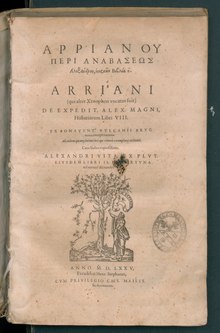Arrian
Appearance
Lucius Flavius Arrianus 'Xenophon' (c. 86/89–c. after 146/160 CE), known in English as Arrian, was a Greek historian and philosopher.
| This article about a historian is a stub. You can help out with Wikiquote by expanding it! |
| This article about a philosopher is a stub. You can help out with Wikiquote by expanding it! |
Quotes
[edit]
- He also buried the Persian commanders and the Greek mercenaries who were killed fighting on the side of the enemy. But as many of them as he took prisoners he bound in fetters and sent them away to Macedonia to till the soil, because, though they were Greeks, they were fighting against Greece on behalf of the foreigners in opposition to the decrees which the Greeks had made in their federal council. To Athens also he sent 300 suits of Persian armour to be hung up in the Acropolis as a votive offering to Athena, and ordered this inscription to be fixed over them, "Alexander, son of Philip, and all the Greeks except the Lacedaemonians, present this offering from the spoils taken from the foreigners inhabiting Asia
- Anabasis Alexandri I, 16, 7.
- Your ancestors invaded Macedonia and the rest of Greece and did us great harm, though we had done them no prior injury; … [and] I have been appointed leader of the Greeks …
- Anabasis Alexandri II, 14, 4.
- This also is remarkable in India, that all Indians are free, and no Indian at all is a slave. In this the Indians agree with the Lacedaemonians. Yet the Lacedaemonians have Helots for slaves, who perform the duties of slaves; but the Indians have no slaves at all, much less is any Indian a slave.
- Arrian, Anabasis Alexandri, Book VII : Indica, as translated by Edgar Iliff Robson (1929), p. 335
- No Indian ever went outside his own country on a warlike expedition, so righteous were they.
- Arrian, Anabasis Alexandri, Book VII : Indica, as translated by Edgar Iliff Robson (1929), p. 18
- Alexander sacrificed to the gods to whom it was his custom to sacrifice, and gave a public banquet, seated all the Persians, and then any persons from the other peoples who took precedence for rank or any other high quality, and he himself and those around him drank from the same bowl and poured the same libations, with the Greek soothsayers and Magi initiating the ceremony. Alexander prayed for various blessings and especially that the Macedonians and Persians should enjoy harmony as partners in government. The story prevails that those who shared the banquet were nine thousand and that they all poured the same libation and gave the one victory cry as they did.
- Anabasis Alexandri, 7.2.6-9
- They (Indians) are remarkably brave, and superior in war to all Asiatics; they are remarkable for integrity; they are so reasonable as seldom to have recourse to law suits, and so honest as to require neither locks to their doors nor writings to bind their agreements. They are in the highest degree truthful.
- in :Sunderland, Rev. Jabez T. Indza in Bondage. Her Right to Freedom Lewis Copeland Company New York 1929p. 178. Quoted and attributed in Londhe, S. (2008). A tribute to Hinduism: Thoughts and wisdom spanning continents and time about India and her culture
About Arrian
[edit]- Arrian mentions with admiration that every Indian is free. With them, as with the Lacedemonians, he says, no native can be a slave; but unlike the Lacedemonians, they keep no other people in servitude.
- The History of India, by Mountstuart Elphinstone (Indica, ch. X and Ephinstone's India p. 239).

